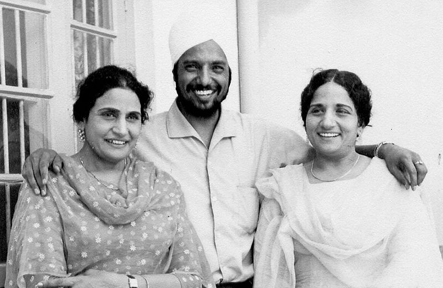
- By Paramjit Singh Batalvi
CHANDIGARH (TIP): The one memory that Didar Singh Pardesi perhaps cherishes the most in his illustrious music career is when his idol, Mohammad Rafi, came on stage and embraced him after hearing him sing.
“He was adorable and so affectionate. I was left entirely speechless. He not only appreciated my singing, but showered a big bundle of blessings upon me… After that, people started calling me the ‘Rafi of East Africa’,” recalls Pardesi, now 87 and settled in London.
Pardesi has recorded several literary compositions of Punjabi poets like Shiv Batalvi, Prof Mohan Singh, Sohan Singh Josh, Surjit Patar and many others, but his name became synonymous with ‘Raat chaanani main turan te mera naal turey parchavaan ni jindey meriye’ (O my love, you walk along me like my shadow in the moonlit night).
A cousin of the late poet Surjit Patar, Didar was born in 1937 at Pattar Kalan village in Jalandhar. He was just two when his mother passed away. “My grandmother raised me. We were poor and my father went to Kenya to earn a living. When I was 14, I joined him. I graduated there and became a teacher in a government school. I taught for 37 years and retired as a headmaster, before shifting to the UK.”
Didar was five when he started performing at religious congregations in his village gurdwara. “When I went to Kenya, I retained my passion for singing Punjabi songs and gave a good number of musical performances on stage and radio. During my visits to Punjab, I would sing for Jalandhar Doordarshan and Akashwani Radio,” he recalls.
Several of his albums were well received — ‘Ambi Da Boota’, ‘Kach Da Glass’, ‘Hasratyein’, ‘Tutte Dil’, ‘Salma Ki Yaad Mein’, ‘Dashmesh Da Darbar’, ‘Nangiyan Shakhaan’ and ‘Pyasian Roohan’.
“I was the first Asian singer to have been recorded by Phillips Record Company in East Africa. In 1969, I was invited to Bollywood for recording songs for Hindi movies like ‘Do Shikari’, ‘Anjana Safar’ and ‘Mehmaan’. I was on 15 days’ leave for these recordings. I consider myself the luckiest to have recorded songs with singers I adored, like Mohd Rafi, Asha Bhosle, Hemlata and Meenu Purushottam,” he says. The lyrics were penned by Sahir Ludhianvi and the music was composed by Ravi and Chitragupt.
“Sahir Ludhianvi advised me to shift to Bombay and make a fortune there, but my job security and pressure from my wife and two daughters put me in a fix. I ultimately chose to continue with my job and returned to East Africa.”
Didar Singh Pardesi has a glint in his eyes when he recalls his meeting with the famous sarod player Ustaad Ali Akbar Khan. “He asked me to sing ‘Heer Waris Shah’. When I did, he was so elated that he blessed me with his diamond ring and gold buttons of his shirt and said, ‘Didar Singh, my child, you have won my heart, I have nothing else to offer, you are marvelous and matchless. Keep it up my son and keep on serving your mother tongue and your folk music.’ These words still resound in my ears and I consider them as priceless and eternally unforgettable.”
If Didar Singh Pardesi has one regret, it is that the people of Punjab are losing their traits of love, affection and respect for one and all. “The modern Punjabi singers do not exhibit any responsibility towards their mother tongue and for their age-old folk music. They are merciless businessmen,” he feels.
It is high time the Punjab government honored the veteran artist.
(Source: Tribune)





Be the first to comment